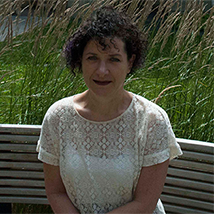Director of the King’s Contemporary Studies Program Dr. Dorota Glowacka will participate in the upcoming webinar panel Claude Lanzmann’s Shoah and the Mise-en-scène of Translation. The panel, which is open to the public, will begin at 2 p.m. AST on November 10. The panel forms part of the virtual conference Translating Holocaust Testimony: A Conversation between Translation and Holocaust Studies, an event presented by the Azrieli Foundation in partnership with Concordia University.

Dr. Dorota Glowacka, Contemporary Studies Program director
Through the presentation Found in Translation: From False Witness to Co-witnessing in Claude Lanzmann’s Shoah, Dr. Glowacka will address how Lanzmann treated the Polish language in his acclaimed film, and what that treatment reveals about the director’s biases. The decision to explore this topic came about in response to the way Lanzmann’s film was received in Poland, and how that reception has evolved over time.
“In my view the film’s now 35-year presence in the Polish cultural imaginary has corresponded to social and political upheavals in that country, particularly in relation to the various stages of the debate about Polish-Jewish relations.”
“[…] What has remained constant through these different phases of the film’s reception is the view that the film only emphasizes the conflict between Polish and Jewish memories of the fate of Polish Jews during the Holocaust—[this is] the view that I’m hoping to challenge!”
For Dr. Glowacka, a reading of Lanzmann’s treatment of Polish throughout the film is key to a deeper appreciation of the manifold stories the film holds.
“Lanzmann’s task was to tell the story of the extermination of European Jews, and part of that task was to unmask Polish prejudices and hostility toward the Jews. In my view one of his strategies was a linguistic one, aimed at the Polish language as the carrier of Polish national values and attitudes, which included a centuries-old legacy of anti-Semitism. It seems that, throughout the Polish translation sequences [the] Polish language itself—indelibly marked by the trauma of the extermination of Polish Jews—is put on trial before the camera.”
Dr. Glowacka asserts that Lanzmann ultimately introduced to the film a “colonial gaze” which bore “contempt for the language of the native and replacing it with a more civilized tongue…” Noting that Lanzmann shows great attention to detail elsewhere, including in his treatment of other languages, by contrast Dr. Glowacka points to the many misspellings of Polish proper names that are found in the English subtitles of the film and in the book Shoah: The Complete Text of the Acclaimed Holocaust Film.
“I’m interested in the complicated relation between the performance of language, translation and testimony in the film. However, in contrast to what I see as Lanzmann’s dismissal of Polish testimony—his view that Poles were ‘false witnesses’—I give credence to Polish villagers’ desire to testify to what happened to the Jews, even though what they say is overlaid with anti-Semitic prejudice.
“As a matter of fact, protracted translation sequences in Lanzmann’s Shoah reveal the extent to which language as such is implicated in symbolic violence. In Poland negative stereotypes about Jews have been woven into the very fabric of the Polish language, in the form of linguistic fossils and dead metaphors whose forgotten roots reach deep into the past.”
Against what Dr. Glowacka perceives to be the director’s contempt for the Polish language and his effort to control and even suppress testimony in that language, she refers to some of the exchanges between the witnesses in the film as “co-testimony” and she argues for the importance of reclaiming these complex instances of co-testimony from Lanzmann’s “mistranslations.”
To find out more about the Translating Holocaust Testimony: A Conversation between Translation and Holocaust Studies visit the conference website.
Dr. Glowacka is also scheduled to deliver a talk on November 18 entitled Holocaust Memory and the Settler Colonial Genocide in Canada as part of the panel Virtual Conversations with Holocaust Researchers: Contemplating Holocaust Memory in Post-Colonial Societies. Hosted by The Holocaust Studies Program at Western Galilee College the panel, beginning at 1:30p.m. AST, will consider “…local histories of colonialism with global developments in Holocaust memory and invites a dialogue between two master narratives of the twentieth century: The Holocaust and post-colonialism.”
Read more about Virtual Conversations with Holocaust Researchers: Contemplating Holocaust Memory in Post-Colonial Societies and attend by registering online.

